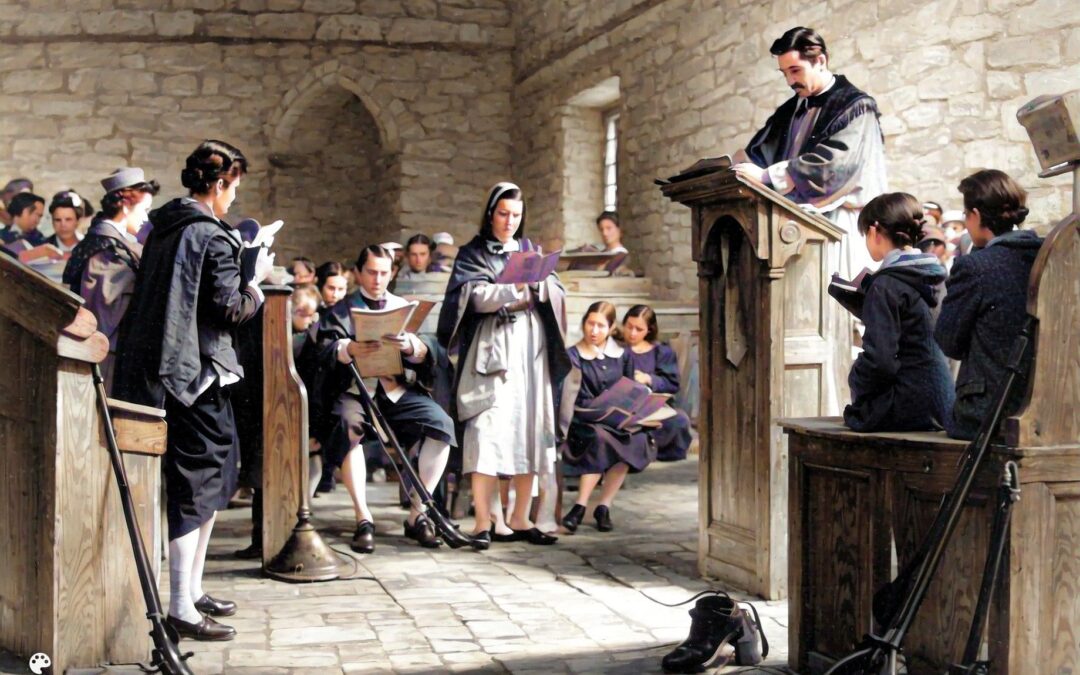“For in six days the LORD made heaven and earth, the sea, and all that in them is, and rested the seventh day: wherefore the LORD blessed the sabbath day and hallowed it.”
(Exodus 20:11)
The sabbath of the Lord is a day of rest (not an hour of church!) that God sanctioned at creation to be held as sacred and reserved for spiritual restoration and prayerful worship of him. From the beginning of the world to the resurrection of Christ, the sabbath was observed on the last day of the week but was changed to Sunday after his resurrection, since the resurrection occurred on the first day of the week. Scripture refers to the first day of the week as the Lord’s Day, and we often reference it as the Christian Sabbath.
The sabbath is a day different from other days, for it is a holy day, established as such by God’s moral law recorded in Exodus 20:10: “It is the Sabbath of the Lord thy God.” This sacred rest of the seventh day, both in the Old and New Testaments, is of divine institution (Acts 1:3, 20; 1 Cor. 16:2; Rev. 1:10) and is commanded to be kept. Otherwise, there would only be nine commandments instead of ten, and God’s injunction to keep the sabbath holy would be nothing more than a social policy, a human constitution, or an ecclesiastical tradition.
But this is not the case, because God indeed blessed and sanctified the sabbath as holy. And he alone has the power to ordain and dedicate such a thing to a holy use. So we may rightly concur that God’s blessing of the seventh day is a bestowing of honor on that day above the other six days.
Further, God promises spiritual benefits to those who observe this 24-hour period in worship of him. Isaiah 58:13-14 states, “If thou turn away thy foot from the sabbath, from doing thy pleasure on my holy day; and call the sabbath a delight, the holy of the LORD, honorable; and shalt honor him, not doing thine own ways, nor finding thine own pleasure, nor speaking thine own words: Then shalt thou delight thyself in the LORD; and I will cause thee to ride upon the high places of the earth, and feed thee with the heritage of Jacob thy father: for the mouth of the LORD hath spoken it.”
Knowing this, how should we then spend the sabbath? It should be a day devoted to turning our minds and hearts fully toward him in worship, thanksgiving, and praise. We should spend time meditating on his works and his Word, while resting from our everyday responsibilities of this world and our work. William Gouge rightly said, “This rest in which the Sabbath consists of is not about being idle or doing nothing at all. But rather, in forbearing the ordinary works of the six days, the works of our worldly calling.”[1] Such a practice not only allows for needed respite but also the promise of happiness and blessing.
Following the pattern of Christ’s work in Hebrews 4, the practice of observing the sabbath as a holy day is a demonstration of his resurrection power in the lives of his people. In addition, Hebrews 4:9 reminds us that this sabbath rest is a foretaste of that eternal, heavenly rest of God where we will forever cease from the works of this world… “There remains, then, a Sabbath-rest for the people of God.”
Contemplations:
- Lord, help me see the pattern God sanctioned by the sabbath to be applicable to me and my life as it has been applicable to the children of men throughout all ages – namely by working six days in every week and then resting to my great delight in you on the seventh.
- What does it mean for me to sanctify something you have sanctified? This is for me to personally acknowledge and appoint a thing to a holy use in my own life, a practice which is useful for my own sanctification.
- Help me in all areas, Lord, to regard you as holy, even as the Lord’s Prayer instructs us. Help me grow in Christ’s holiness, as you say in 1 Thess. 5:23, “The God of peace sanctify you throughout.” Sanctify me throughout that I might be wholly sanctified for you to do with me as you will.
Further References for Exodus 20:11:
Gen. 2:2-3; Exod. 31:17; Lev. 23:3; Deut. 5:13.
[1] William Gouge, A Learned and Very Useful Commentary on the Whole Epistle to the Hebrews (London: A.M., T.W., 1655), 413–414.


